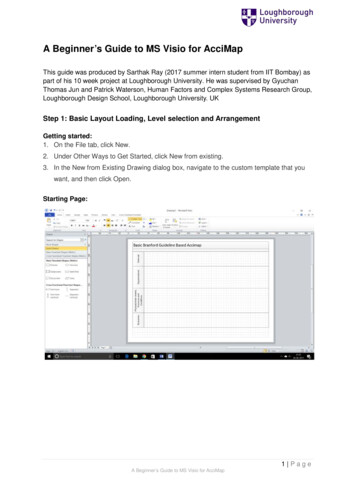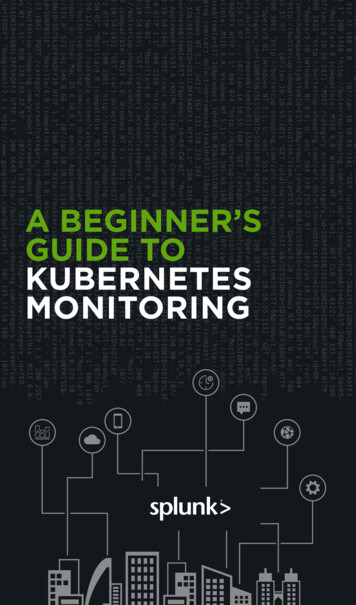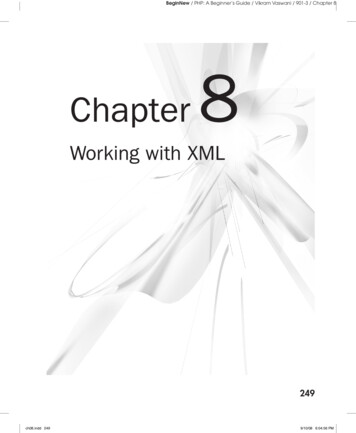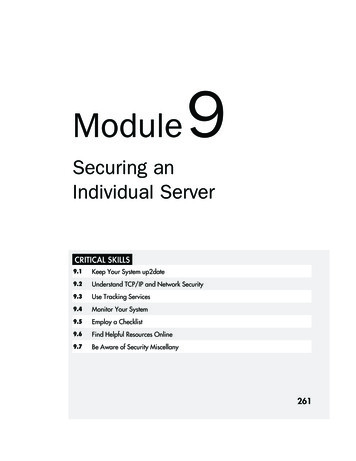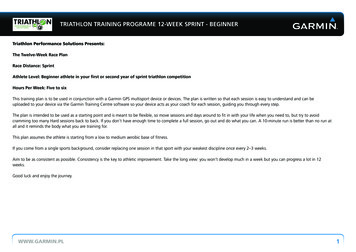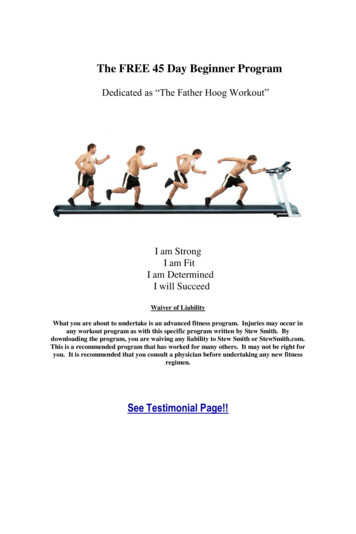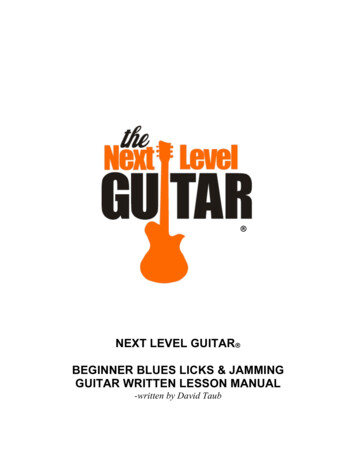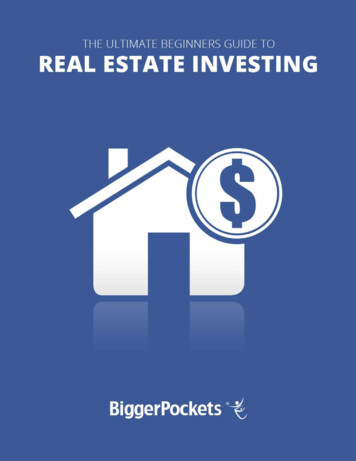
Transcription
Over the many years that we've been serving realestate investors, one of the most asked questionson our site has been, "How Do I Get Started in RealEstate Investing?"People from all over the world have been coming to BiggerPocketsto find the answer to that question. While some might lead you tobelieve that there is a simple answer that works for everyone, thatsimply isn't the case. We've built this guide to help simplify theprocess of figuring out how YOU can get started. Of course, thisguide is not an all-encompassing "how-to" manual about everyaspect of real estate investing, but a broad-stroke overview of thebest ways to start down your path to financial freedom through realestate investments.What to Expect in This Beginner's GuideThis guide contains eight chapters, each focusing on a specific part of your investing journey. If you canmaster these, you increase your chance of building wealth through real estate and minimize the risk offailure or loss. This guide will walk you through the following:Your Real Estate Investing Education Before you start investing in real estate, it is imperative that you get educated in the importantconcepts. There are dozens of ways to get educated and build your knowledge base, and Chapter 2will focus on those areas in great depth.1 Ultimate Beginner’s Guide to Real Estate Investing
Choose Your Real Estate Niche and Strategies There are a number of different strategies and angles from which to approach the business of realestate investing. The more you focus on one specific thing, the better and more knowledgeable youbecome at it. This will be the focus of Chapter 3, as we dive deeper into looking at the variousniches and strategies you can profit from in your real estate investing journey.Create Your Real Estate Business Plan As the ancient proverb goes, a house built upon sand is subject to collapse. By creating a strongfoundation that your real estate investing endeavors will stand upon, you will create a moresustainable business that can weather the storms you may face. Chapter 4 will show you the bestways to build that foundation to maximize the odds of your success.Find the Best Investment Properties When it comes time to actually make your first investment purchase, it is vitally important that youdon't pay too much and that you invest in the right kind of property. Chapter 5 will dive into thespecifics of how to set proper criteria to guide your investment decision making.Financing Your Real Estate Investments Paying for your investment is much different than paying for a loaf of bread - and the method usedcan often mean the difference between success and failure in a real estate investment. Chapter 6will dive into the various financing tools you can use throughout your investing career.Mastering Real Estate Investment Marketing Regardless of what aspects of real estate investing you choose to focus on, you will undoubtedlyneed to have a strong marketing skill set. Too many investors have the “if you build it, they willcome” mentality when it comes to real estate. Putting together the right marketing program andallocating the necessary amount of resources towards it is absolutely crucial to the success of anyreal estate investing business over the long term. Chapter 7 will focus on the marketing aspect ofyour real estate investing business.Knowing and Executing Your Exit Strategies How you plan on exiting your real estate investments is just as important as the way you enterthem. Whether you sell, rent, or exchange your property, it is vitally important to have a clearunderstanding of your exit strategy options for any investment deal from the beginning in order tominimize your risk. Chapter 8 will discuss these exit options in detail to help you plot your realestate investing course.2 Ultimate Beginner’s Guide to Real Estate Investing
Are You Ready to Begin?As you work your way through this guide, remember that this is not all-encompassing. It is a 40,000 foot viewof how real estate investing works and is designed to give you the basic tools to get past the all importantquestion of how to get started. As you read along, make note of any questions or highlights, and then comeback to BiggerPockets.com and search the site or ask questions on our Forums to learn more about anythingon your mind. If you're unfamiliar with our site, BiggerPockets.com is an online community of real estateinvestors with the web's largest collection of advice for new and experienced investors and is free to join andto begin participating, learning, and growing.“Starting any new endeavor can be scary. Our goal with UltimateBeginner’s Guide is to help alleviate the fears of new investors by givingthem the tools they need to be successful in their real estate investingjourney. ”Josh Dorkin, Founder and CEOBiggerPockets.comIf you are new to BiggerPockets, start with our real estate forums. The BiggerPockets Forums contain morethan 1,200,000 posts about every aspect of real estate investing, updated hundreds of times daily. Searchthrough the site or create a new thread and ask any questions you might have; many of our 270,000 members will be there to help answer your questions. Also, check out the BiggerPockets Blog, which holdsmore than 6,000 articles from experienced investors in many different real estate investing niches, as well asthe BiggerPockets Podcast, now the leading real estate podcast on iTunes. These sources, along withhundreds of other pages on the site, make BiggerPockets.com the largest source of real estate investingknowledge on earth.Within these chapters, there are numerous links to additional articles and discussions found onBiggerPockets. We recommend you take the time to scour these, as they will help answer many of thequestions you've got and will explore topics that are sure to be important to you on this journey. Of course, ifthere are questions that this guide or the articles do not address, please be sure to ask them in our realestate investing forums.If you are not a member already, please take a moment right now to sign up for a free membership onBiggerPockets.com. Go to BiggerPockets.com/signup.It is perfectly natural to be intimidated, but our goal at BiggerPockets is to help you overcome your fearsand your countless questions by providing as much free information as possible to help you make the bestdecisions for your own needs.If you are ready to begin the Ultimate Beginner's Guide to Real Estate Investing, click below to turn toChapter 1.3 Ultimate Beginner’s Guide to Real Estate Investing
"Ninety percent of all millionaires become so throughowning real estate."Andrew CarnegieReal Estate Divider Are you new to real estate investing? Learning how to invest in real estate doesn't need tobe complicated, difficult, or expensive. In this beginner's guide, you will learn how to get started investing inreal estate from beginning to end - with no hype, false promises, or pitches.THIS CHAPTER INCLUDES: Can I Invest in Real Estate if I Have a Full Time Job? Do I Need to Pay Some Guru in Order to Be Successful? Can I Invest in Real Estate if I Have No Money? Is Real Estate Investing a Way to "Get Rich Quick?" What to Expect in This Beginner's GuideWHY INVEST IN REAL ESTATE?There are many different places you can stick your money other than under your pillow, including stocks, bonds, savings,mutual funds, CD, currencies, commodities, and of course, real estate. There are positive and negative aspects of eachinvestment option, but since we're here to learn about real estate, we'll focus on that and that alone.4 How to Invest In Real Estate
One of the most commonly stated reasons that people give forinvesting in real estate is that they are seeking out financialfreedom, but there are others as well -- of course, each personwill have their own personal reasons why. They are typicallyseeking one or several of the following: Appreciation Cash Flow Depreciation Leverage Tax BenefitsThe decision to begin investing in real estate is a personal one, and we absolutely recommend you make sureyou and your family are 100% committed before deciding to move forward in doing so.For more details on these reasons, see: Why Invest In Real Estate Top 5 Reasons to Invest in Real Estate Top 5 Reasons to Invest in Real Estate Instead of Paper AssetsCan I Invest in Real Estate if I Have a Full Time Job?Yes. The kind of real estate investing you might see on television or mighthear about from a guru is not the only kind of real estate investing outthere. In many situations, that kind of investing is not even investing atall, but simply gambling or speculating.The truth is, there are hundreds of ways to make money in real estate.Some of these techniques or strategies might require forty hours a week,while others might only require forty hours per year. The amount oftime it takes to grow your real estate business largely depends on yourinvesting strategy, your personality, your skills, your knowledge and yourtimeline.You’ve probably heard the age-old high school guidance counselor question, “If you suddenly had one milliondollars and didn’t have to work anymore, what would you do?” The answer, it’s said, is what career field youshould be in. Would you invest in real estate?If your dream path would be to open up a shelter for abused animals or to move to Aruba and train touriststo surf, you probably should not be a full time real estate investor.5 How to Invest In Real Estate
That's not to say that you shouldn't invest in real estate -- you just probably shouldn't go full time.However, you don’t need to make real estate your career in order to build wealth in real estate. If you loveyour job, you don’t need to quit it to invest in real estate. You can achieve the same or better results as a fulltime real estate investor by investing on the side.“One of the perks of investing while working full time is thesteady income stream to fund and support your real estateinvestments. Don't underestimate the importance of this!”-Brandon TurnerCommunity Manager, Biggerpockets.comAdvantages of Investing While Working a Full-Time JobBy keeping your day job, you have several advantages over full-time investors. First, you do not need to liveoff any of the cash flow you make -- that's what your 9-5 is for. By reinvesting all the profits from yourinvestments, you can fully realize the incredible benefit of exponential growth. Additionally, you have a mucheasier ability to get long-term bank financing thanks to the stable income from work, which can also helpincrease and stabilize your wealth building.Investing in real estate while keeping your day job can be done in many ways, such as: Partnering in a larger piece of property Buy-and-hold property with propertymanagement Serving as a private or hard money lender Investing in notes (mortgages)Real estate can be highly profitable as a career or if you're justinvesting while working a "normal job." However, the choice isyours as to which path you take. Don’t simply decide to quityour job and become a full time investor because you readabout other investors who have been successful doing it thatway. Having a concrete plan for how you're going to proceed inreal estate is essential; we'll get into that a little later in theguide.That said, life is too short to be stuck in a job you hate. Choose a career that makes you excited to wake up inthe morning, energized throughout the day, and content when you fall asleep at night. If that desire leadsyou to full time real estate investing, welcome to the club! Just make sure you are not simply building acareer, but building a future.6 How to Invest In Real Estate
Also be sure to check out: BiggerPockets Podcast 006: Investing While Holding a Full Time Job with Arthur Garcia BiggerPockets Podcast 008: Learning to Be a Profitable but Ethical Landlord with Al Williamson BiggerPockets Podcast 023: Flipping While Work ing a Job, Partnerships, and Military Investing withJames Vermillion BiggerPockets Podcast 033: How to Close 27 Deals in Your First Year While Working Full Time with SamCraven BiggerPockets Podcast 037: Full Time Income, Part Time Lifestyle Real Estate Investing with AaronMazzrillo BiggerPockets Podcast 051: Small Multifamily Properties, Work ing a Full Time Job, and TrainingTenants with Mik e Sherwood BiggerPockets Podcast 054: Investing in Under 30k Real Estate, Working a Day Job, and Good Vs. BadNeighborhoods with Lisa Phillips BiggerPockets Podcast 058: Flipping and Wholesaling Homes While Working Full Time with JustinSilverioDo I Need to Pay Some Guru In Order to Be Successful?Absolutely not. Countless investors have become successful without thehelp of the guru crowd. The goal of many of these individuals is to sell youon the dream of fast riches, fancy cars, easy money, and so on -- many preyon people who desperately want to make money and often use very slickand often dangerous (for you) techniques to sell you on their veryexpensive courses, bootcamps, mentoring, training, etc. In fact, the tacticsused to get you hooked are very well documented, and there is absolutelyno such thing as a free lunch.Keep in mind that there are many in our industry who benefit from the marketing of these gurus. Mostwebsites focused on the investment niche affiliate with them, making large referral fees -- often on the orderof 50% -- in return for marketing their wares. Additionally, a large percentage of real estate clubs derive theirrevenues from products and events sold by gurus who "teach" there. And yes, they also get a nice 50% cutfor doing so.Remember, real estate gurus are in the business of marketing and selling you on the dream. Through thisguide and the thousands of articles and hundreds of thousands of discussions available on BiggerPockets,you can absolutely learn everything that you'd pay thousands of dollars to a guru for, and you can do so forfree. If you want to read an excellent article about the guru seminar trap, read "The Real Estate Guru Trap –How It Works & 4 Ways to Avoid It." Also, if you find a real estate guru that you are interested in learningmore about, be certain to be careful, and check out our real estate guru review forum to find out the realdeal from other investors.7 How to Invest In Real Estate
That all said, they aren't all bad, and some of these individuals are very knowledgeable. Just remember:caveat emptor (let the buyer beware). Do your homework and don't get caught up in the hype or promise ofsecrets; there aren't any.Also be sure to check out: Purchasing a Real Estate Investing Guru Program? Read This First! Don’t be hypnotized by the “Guru of the Week”! Real Estate Gurus Promoting Other Guru Courses and Events – a Scam? BP Podcast 017 – Finding Mentors, Facing Retirement, and Note Investing with Jeff BrownCan I Invest in Real Estate if I Have No Money?The simple answer is: yes, it is possible to invest in real estate if youdon't have any money at all. However, there is money involved in everyreal estate transaction. The issue, therefore, is not whether you'reinvesting with "no money," but instead whether you’re investing with"none of your own money." Investing in real estate without using any ofyour own money requires using Other People's Money (OPM) -- learningto strategically invest in real estate without any of your own money isone of the most complex but important tools you can develop in yourreal estate investing career.The key to investing in real estate without any money of your own is simple: bring something to the table. Ifyou lack money, there are other things you can bring to the table in a transaction -- if structured correctly -including education, time, connections, confidence, intelligence, and creativity. By reading this guide, you arealready taking steps toward building your strengths in those areas.Many investors use little or none of their own money when investing in real estate by using one of severalmethods that include: Wholesaling Using partners Using lease option strategies Via FHA 3.5% down payment loans Using USDA or VA no-down payment loans With home equity loans or lines of credit Using private/hard money.8 How to Invest In Real Estate
We will look at each of these areas in more depth later in this guide, but we want you to recognize thatinvesting in real estate without income is possible, but may not be as easy as the gurus would have youbelieve.For more information on investing in real estate without any money, please see: 5 Ways to Start with No Money and No Credit? How to Close a Subject-To Deal with No Money Down Can You Really Flip Houses With No Money? Forum Discussion: Wholesaling With No Money Down Flipping, Marketing, and Wholesaling with Danny Johnson BP Podcast 050: Getting Started and No Money Down House Flipping with Mike SimmonsWorking in Real Estate Without Investing at AllMany would-be real estate investors get their start by simply working in the real estate industry – earningmoney while gaining a solid hands-on education. Here is a brief list (far from exhaustive) of careers you cantake on to learn the real estate business: Real Estate Agent Mortgage Broker Appraiser Construction Worker Resident Manager Title/Escrow Agent Project ManagerIf you are looking to get into real estate investing with no experience and no money, choosing one of thesecareers may be a great way to get your feet wet in the industry and to help you begin plotting your careerinto full time real estate investing. The experience you'll gain from mastering one or several of the othertrades in the industry can be invaluable in helping you be successful.Is Real Estate Investing a Way to "Get Rich Quick?"How many late-night real estate infomercials have you seen where the real estate guru is sipping drinks onthe back porch of his beachside home, next to beautiful women in expensive (or minimal) clothing, tellingyou that this life is for you?9 How to Invest In Real Estate
No doubt one of the largest draws to real estate investing is the image of investors driving fancy cars, living inlarge homes, and being all around "rich." While many real estate investors do build significant wealth overtheir career, real estate investing is not a "get rich quick" scheme. Yes – there are some who make a lot ofmoney in a short time; however, these situations are generally the exception, not the rule.Investing in real estate takes planning, patience, and persistence. Don't expect to make millions of dollars inyour first year. Instead, plan on creating a business through real estate that will grow steadily year after yearto enable you to meet your financial goals -- and hopefully your dreams. No matter what you might hearotherwise, being successful in real estate requires hard work, just like it does in any other field. It is alsoimportant to know that there are no shortcuts to being successful in real estate -- there are no products ortools that will do the work for you, either. You must learn the fundamentals and then apply them. Of course,our goal here is to help you with that.For more information on "get rich quick" investing see: If You're Not Building Wealth – You Might Be inThe Wrong Game Forum Discussion: Real Estate: A Get Rich SlowBusiness. Slow and Steady Wins the Race FAST Nickels vs. SLOW Dimes: As a Real EstateInvestor, Which is Better?Moving OnBy the end of this chapter, you should have a clear vision for why real estate can and should be an importantstep for building wealth for your future. Whether you decide to go full time or just invest on the side, realestate can be the path toward financial future for you and your family. In the next chapter, we are going tolook at the very first step (and one of the most important) you should take on your journey: your education.When you are ready, turn to Chapter 2 and let's get you on your way to starting out in real estate.10 How to Invest In Real Estate
"A journey of a thousand miles begins with a single step."Lao-tzuThis chapter is very important in your real estate investingjourney. Without a clear understanding of the principles foundin this chapter, you are at a much higher risk of failure anddefeat in your real estate dealings. In fact, if you onlyremember one chapter in this entire guide, we sincerely hopeit's this one. Let this be your first step to a successful future inthe real estate investing world.In this chapter, we'll cover: Don't Skip Your Real Estate Education Real Estate Terms and Mathematics Mentors, Gurus, and You Overcoming Fear Analysis Paralysis11 Real Estate Investing Education
Don't Skip Your Real Estate Investing EducationAs we discussed at the end of chapter one, real estate investing is not a “getrich quick” scheme. Just as any solid home needs a strong foundation, thesame is true when it comes to your real estate education -- a solid foundationis key to a long-lasting business.This guide, while not exhaustive on every aspect of real estate investing, willhelp develop that foundation. We put it together to be a first step in your realestate education – and as an introduction to the possibilities that come withreal estate investment.There are many different ways to get educated in real estate investing, andyou don't need to pay hundreds or thousands of dollars to learn the business. Below, you'll find a list of a fewsources of real estate investing education; be sure to consider each before making a final decision on howyou're going to move forward -- what works for one person may not work for another.Sources of Real Estate Investing EducationBooks -- real estate booksAs the old saying goes, “Those who lead,read.” Books are fundamental in gaining an education in real estate andperhaps the most widespread learning method for investors. Realestate books are produced each year by the thousands, and everymajor bookstore in the world contains a whole section on real estateinvesting. Chances are, if there is a way to make money from realestate, there has been a book written about it. If reading books,however, is not within your arsenal of skills, you are in luck. Today, welive in a world where nearly every new book is also made into anaudiobook. (Try Audible.com for the web's largest selection.)Blogs -- real estate blogsBlogs, short for an older term called a “Web log” are acollection of short essays written about a topic. Blogs can be an amazing source ofinformation, and there are fantastic ones for every topic you can imagine. Thereare many great ones written by people living in the trenches of real estate worthchecking out and learning from. Be sure to check out the BiggerPockets Blog,which features dozens of expert contributors sharing their best tips and advice, aswell as the BiggerPockets member blogs (TK) for great examples of real estateblogs. You can also see a list of BiggerPockets' “Top 35 Real Estate Blogs” and discover new favorites.Mentors -- real estate mentorsPerhaps the most powerful way to gain a good education in any field of studyis through a mentor -- and the same holds true in real estate. While there are dozens of professional realestate mentors who charge for their service, there are also millions of mentors all over the world that willcost you as little as a cup of coffee - they are your local investors. People enjoy sharing what they know, and12 Real Estate Investing Education
seasoned real estate investors are no different. By introducing yourself to a successfullocal real estate investor who you would like to become more like, you'll have theopportunity to learn from someone in the field who knows your market and who canultimately become a partner as you come to become successful yourself. We'll talk moreabout mentors later in this chapter.Podcasts -- real estate podcastsOne of the newest innovations in the world of real estateinvestor education is the Podcast. A podcast is simply a recorded audio program, similar to aradio show, that can be produced by anyone with a computer and a microphone. There havebeen a number of great podcasts that have emerged in the last few years. If you have asmartphone or MP3 player, you can listen to hundreds of hour long shows covering a widevariety of real estate topics whenever you want – whether in the car, jogging, or lying in bed -for free. Be sure to check out the pitch-free BiggerPockets Podcast or search iTunes for otheroptions.For more information about gaining a solid education, check out these posts: Real Estate Guru Courses: Are They Worth It? Do I Need to Pay Some Guru in Order to Be Successful? 5 Books That Keep Me Focused As A Real Estate Entrepreneur Is Real Estate Investing a Way to "Get RichQuick?" What Is Wrong With Paying For Mentoring, Coaching Or A Guru’s Program? Continuing Your Education is Key for Real Estate Entrepreneurial Success Real Estate Investing Education in the Information Age Bigger Pockets Radio Podcast 003: Getting Started in Real Estate and Raising Money with Brian Burke BP Podcast 011 : The Ultimate Beginner’s Podcast For Real Estate InvestorsReal Estate Mathematics: No More Complex than Junior HighYou don't need to be a college calculus student tounderstand real estate math. In fact, most of themath you'll need is grade-school level. This section isgoing to quickly touch on some of the basic conceptsand math formulas you'll need in your real estateinvesting career.13 Real Estate Investing Education
Income:Income is simply the amount of money that comes in from a property. This math is perhaps the easiest of all:simply add up the amount of rent and any additional fees that comes in.For example – you own a rental house. The home rents for 1000, and the tenant also pays 25 for the use ofthe garage.Your total income was 1025.00.Income could also include late fees, application fees, pet fees, laundry or other vending machines, or anyother value you receive from your rental.Expenses:Expenses are simply the things that cost you money onan investment. For example, the garbage bill for a homeis 50 per month, the loan from the bank was 500 permonth, and maintenance was 100 per month. The totalof these three expenses is 650.00.Your total expenses for this example were 650 for thisparticular month. Keep in mind that there are manyother expenses that you'll face as a real estate investor,including things like taxes, insurance, management,holding costs, capital expenses and various others.Cash Flow:Cash flow is simply the amount of money left over atthe end of the month after all expenses are paid. Todetermine the cash flow, simply subtract the totalexpenses from the total income:Your total cash flow in the above example property was 375.00 for the month. Let's look at a few more mathequations.14 Real Estate Investing Education
Return on Investment:Real Estate MathYour “return on investment” (also known as ROI) is a fancyway of describing what interest rate you are making on your money per year.For example, if you invested 250 and you made 250 from that investment(for a total of 500) over the course of one year, you would have made a100% return on investment. Similarly, if you invested 5000 and made anadditionally 2500 over the course of a year (for a total of 7500) you wouldhave made a 50% return on your investment.The actual calculation for Return on Investment looks like this:ROI (V1 – V0) / (V0), (where V1 is the ending balance and V0 is the startingbalance)A simple scenario for using ROI to calculate an investment return would be as follows: On January 1, you put 1000 into a bank account. On the following January 1, you cash out the account for 1100. Your ROI on theinvestment is:ROI (1100 – 1000) / (1000) .1 (or 10%)You start with 1000 and end up with 1100 after a year for a return of 10%.These simple concepts present the foundations upon which almost all other real estate calculations arebased. The rest will come in time, but most calculations are simply related to these.For more information regarding real estate math, please see:Introduction to Real Estate Investment Deal Analysis (A great comprehensive blog post about real estate investing math)Introduction to Internal Rate of Return (IRR)Return on Investment (ROI) Versus Cash on Cash Return (CCR)Real Estate Investing Mentors:A mentor is an individual who comes alongside you to teach and instruct based on their first-handexperience; they are someone who has lived the life before – walked it, talked it, and breathed it. Finding amentor and learning from those who have come before you is one of the most important steps you can takein your real estate investing education, yet perhaps the most misunderstood. This section is going to focus onwhat a great mentor is, how to find one, and it will look at the question, “Should you pay for one?”15 Real Estate Investing Education
Real Estate Investing Mentors in Your LifeIn your life, who have been your mentors? I'm not talking just real estate – but life in general. There are anumber of different individuals who may have served in a “mentor” role at one time or another, such as:ParentsProfessorGrandparentsBossOlder sibling.Among all these mentors, there exists a common thread that all these sources has: an existing relationshipwith you.These individuals were first in our lives through an existing relationship, and the mentoring relationship greworganically out of it. It wasn't forced or manipulated. There was no formal “mentorship agreement” writtenahead of time, no payment required for mentorship, no force. The only requirement was the relationship.How to Find a "Organic" Real Estate MentorReal Estate MentorsFor those who have been taught that the only mentors are the kindthat cost 19,997.97, the concept of an organic mentor is a profound thought. After all,why would a seasoned professional real estate investor bother to help a newbie? "Won'tI just be wasting their t
Your Real Estate Investing Education Before you start investing in real estate, it is imperative that you get educated in the important concepts. There are dozens of ways to get educated and build your knowledge base, and Chapter 2 will focus on those areas in great depth. 1 Ultimate B
